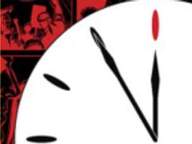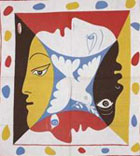It seems scientists are concerned over the Doomsday clock gaining another minute to midnight (oblivion time). According to 'concerned' scientists it is now FIVE minutes to midnight! Now consider runaway climate change, massive extinctions, Corporate pollution at all time high, water table pollution with fracking and the mining of scarce arable land, to mention only a few doomsday scenarios and it makes you wonder who set the time?

A more accurate and REALISTIC measure would be ONE minute to midnight, but we should never forget that 'concerned' scientists are all in the pay of Big Business and 'government,' which Big Business also happens to control!
Now we wouldn't want to upset all the denialists and reality avoiders watching Corporate TV and obliviously sending (micro-wave) texts now, would we? We might end up with a REVOLUTION on our hands or a population that has its PRIORITIES in order! Nah, fuck that, American idol is on, whoopeee! You mindless MORONS, you couldn't move a finger to save your own lives!
Some would say, good riddance to the lot of you, but 'others' (I wonder, doh!) may have something else in store for saving THEMSELVES and what's left of the planet by eliminating 90% of you, pathetic, useless, oxygen-wasting, mindless, human drones.
Oz ABC story follows:
Doomsday clock ticks closer to midnight
The Doomsday clock has ticked another minute closer to midnight on the back of global uncertainty on how to deal with the threats of nuclear weapons and climate change.
"It is now five minutes to midnight," said Allison Macfarlane, chair of the Bulletin of Atomic Scientists (BAS), which created the clock in 1947 as a barometer of how close the world is to an apocalyptic end.
The last decision by the group, which includes a host of Nobel Prize-winning scientists, moved the clock a minute further away from midnight in 2010 on hopes of global nuclear cooperation and the election of US president Barack Obama.
However, the latest decision pushes the clock back to the time it was at in 2007.
Increasing nuclear tensions, refusal to engage in global action on climate change, and a growing tendency to reject science when it comes to major world concerns were cited as key reasons for the latest tick on the clock.
"It is clear the change that appeared to be happening at the time is not happening, not materialising," co-chair Lawrence Krauss said.
"Faced today with the clear and present dangers of nuclear proliferation, climate change, and the continued challenge to find new and sustainable and safe sources of energy, business as usual reigns the norm among world leaders."
The clock reached its most perilous point in 1953, at two minutes to midnight, after the United States and the Soviet Union tested thermonuclear devices within nine months of one another.
It was a far-flung 17 minutes to midnight in 1991 after the two signed the long-stalled Strategic Arms Reduction Treaty (START) and announced further unilateral cuts in tactical and strategic nuclear weapons.
'Worrisome trend'
Robert Socolow, a member of the BAS science and security board and professor of mechanical and aerospace engineering at Princeton University, said a common theme emerged in the scientists' talks this year.
He cited a "worrisome trend, notably in the US but in many other countries, to reject or diminish the significance of what science says is the characteristic of a problem".
But the group said it was heartened by a series of world protest movements - including the Arab spring, the global Occupy demonstrations and protests in Russia - which show people are seeking a greater say in their future.
With plenty of uncertainty in the nuclear realm, even a renewed START deal between Russia and the US has not achieved the progress scientists would like, BAS board member Jayantha Dhanapala said.
"At a time when there are going to be elections in the US, in Russia, in France, and a change of leadership in China, there is some uncertainty therefore about the nuclear weapons programs of these countries and the policies the new leadership will follow," said Dr Dhanapala, a former UN under-secretary general for disarmament affairs.
"The world still has approximately over 20,000 deployed nuclear weapons with enough power to destroy the world's inhabitants several times over."
© 2012 ABC
Mass Panic Over Bird Flu Experiments
http://www.abc.net.au/news/2012-01-11/doomsday-clock-ticks-closer/3767426
